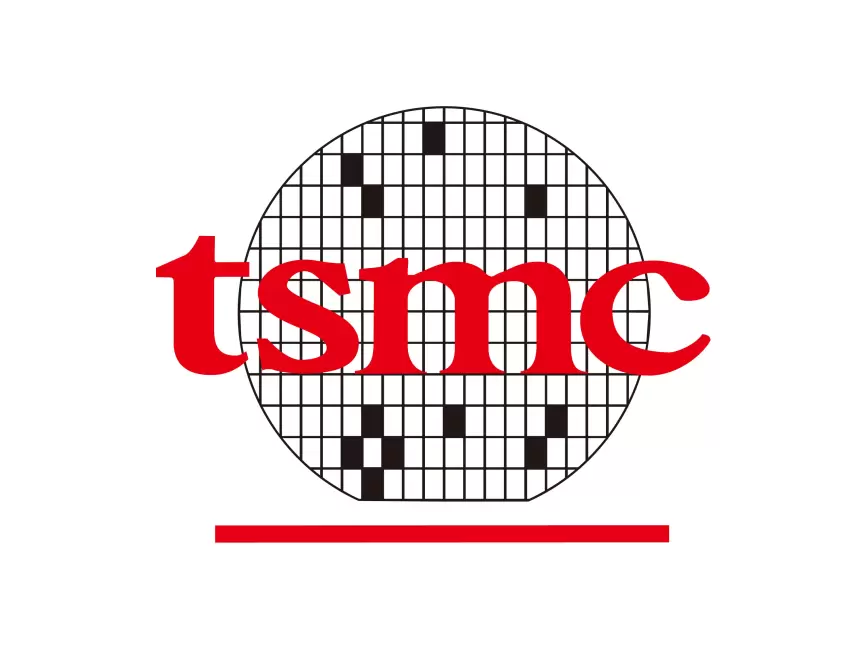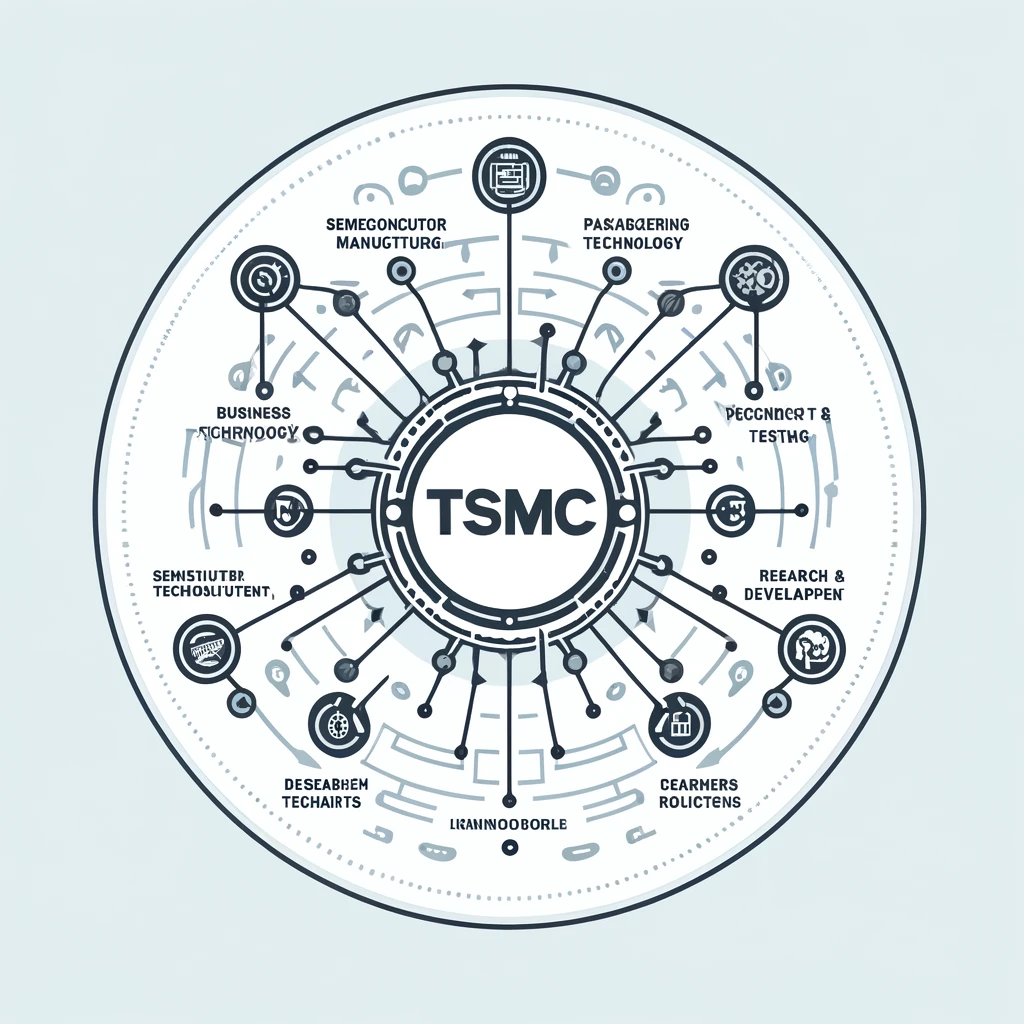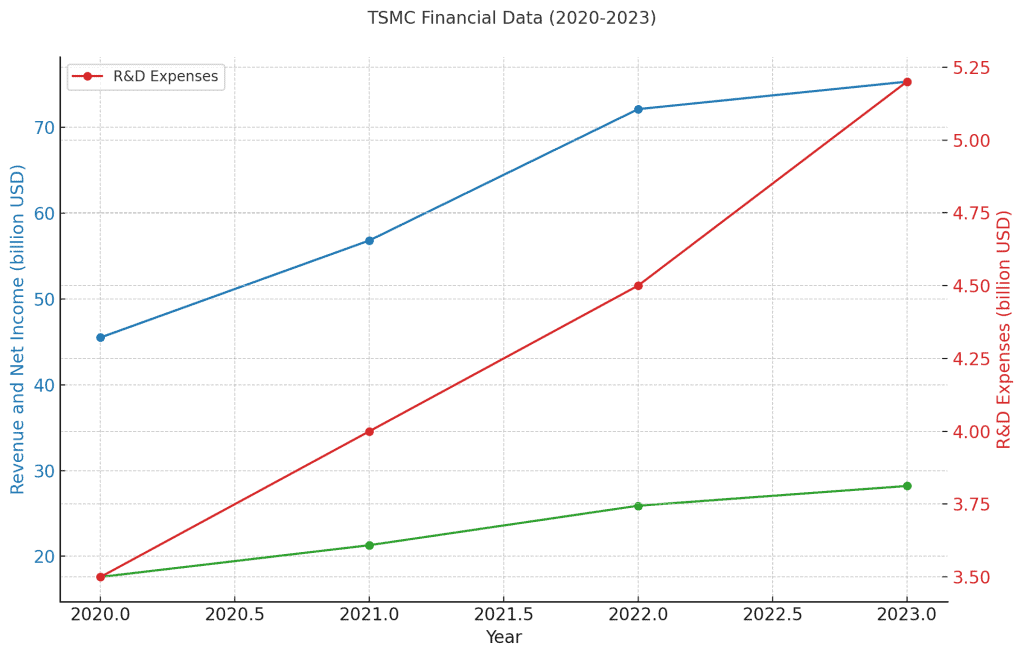
TSMC Corporate Overview
About us
Taiwan Semiconductor Manufacturing Company Limited (TSMC) is a Taiwanese multinational semiconductor manufacturing and design company founded in 1987. TSMC was the world’s first dedicated semiconductor foundry, creating the “pure-play” foundry business model. The company is the world’s second most valuable semiconductor company and the largest independent semiconductor foundry. The company is headquartered in Hsinchu Science Park, Taiwan.
How we got started
TSMC was founded by the Taiwanese government and Morris Chang, a former vice president of Texas Instruments in the United States. In 1986, the Taiwanese government invited Morris Chang to head the Taiwan Industrial Technology Research Institute (ITRI) to develop the semiconductor industry, and he proposed the concept of an independent foundry for semiconductor manufacturing. This concept soon led to the founding of TSMC. Initial capital came from Philips, the Taiwanese government, and several Taiwanese entrepreneurs.
History
- 1987: TSMC was founded
- 1993: Listed on the Taiwan Stock Exchange (TWSE)
- 1997: Listed on the New York Stock Exchange (NYSE)
- 2011: Apple’s A5 and A6 SoCs begin production
- 2014: Commercialization of 7- and 5-nanometer process technologies
- 2018: Maurice Chang retires; Mark Liu becomes Chairman and C. C. Wei becomes CEO
- 2020: Worldwide annual production capacity of approximately 13 million 300 mm wafers reached
TSMC currently plays an important role in the global semiconductor market, with major customers including AMD, Apple, Qualcomm, and Nvidia.
Business verticals

Featured products and services
Taiwan Semiconductor Manufacturing Company (TSMC) produces a wide range of advanced semiconductor products. Its main products include logic ICs, memory ICs, analog ICs, and RF ICs, which are used in a variety of industries, including smartphones, computers, automobiles, and telecommunications equipment. TSMC also provides customized semiconductor design services and production services utilizing state-of-the-art process technologies to meet the needs of various industries.
Core technologies
TSMC has some of the world’s leading semiconductor manufacturing technologies, and is particularly known for its 5nm and 3nm process technologies. These cutting-edge process technologies are essential for producing smaller, faster, and more power-efficient semiconductors. TSMC is also focused on 3D ICs, advanced packaging technologies, and semiconductor technologies for AI and high-performance computing (HPC). These technological innovations play an important role in positioning TSMC as a leader in the semiconductor industry.
Featured customers and partners
TSMC’s key customers are leading technology companies around the world, including Apple, AMD, NVIDIA, Qualcomm, and many other global companies. These customers rely on TSMC’s advanced semiconductor technologies to develop their products. TSMC also partners with electronic design automation (EDA) companies, design centers, IP providers, and others to strengthen the semiconductor ecosystem. These partnerships play an important role in helping TSMC continue to innovate and deliver high-quality products and services to our customers.
Meet the leadership team
Key executive profiles
- Mark Liu – Chairman
- He is Chairman of TSMC and has been on the board since 2017, having previously served as President and Co-CEO. He previously worked as a research manager and process integration manager at AT&T Bell Labs and Intel. He holds a Ph.D. in electrical engineering and computer science from the University of California, Berkeley.
- C.C. Wei – CEO and ViceChairman
- He joined the board of directors in 2017 and served as president and co-CEO from 2013 to 2018. He holds a Ph.D. in electrical engineering from Yale University and has held senior technical management positions at STMicroelectronics and Chartered Semiconductor.
- Rick Cassidy – Senior Vice President, Corporate Strategy and Office of International Operations / Chairman, TSMC Arizona
- Responsible for TSMC’s strategy and international operations, and manages TSMC’s offices in Arizona, USA.
- Wendell Huang – Senior Vice President, Finance & CFO / Spokesperson
- Manage and act as a spokesperson for the company’s financial strategy.
- Lora Ho – Senior Vice President, Human Resources
- Oversees the company’s human resources department, responsible for managing and developing employees.
- Y.J. Mii – Senior Vice President, Research and Development
- He leads TSMC’s research and development and contributes to semiconductor technology innovation.
Organizational structure
TSMC’s organizational structure is comprised of a board of directors and senior management, with various departments and segments working together to achieve the company’s strategic goals. The board of directors reviews the company’s major decisions and provides guidance to management, while independent board members help ensure the company’s sustainable growth and responsible management.
The composition of the Board of Directors is diverse, with members from a wide range of backgrounds and expertise. The Board currently consists of 10 members, 60% of whom are independent directors.
Financial information

Recent financial performance
In its Q4 2023 results, TSMC reported total revenue of NT$62.553 billion (approximately $1.962 billion), down 1.5% year-over-year but up 13.6% from Q3. Net income was NT$23.87 billion, resulting in earnings per share of NT$9.21. The company’s main source of revenue, 3-nanometer (N3) process technology, is growing rapidly, accounting for 15% of Q4 revenue.
Key financial metrics
- Gross profit margin: 53.0
- Operating margin: 41.6
- Net profit margin: 38.2
- Total revenue in 2023: $19.62 billion
- Total net income in 2023: NT$23.87 billion
Stock price trends
TSMC’s stock price is constantly fluctuating and has shown steady growth since its recent earnings announcement. TSMC meets key market metrics and is positively viewed by investors due to its stable financial structure and technological innovation.
Market and competitive analysis
Semiconductor Market Overview
The semiconductor market is expected to rebound in 2024. Overall market revenue is expected to grow by 20%, driven by increased demand, especially in AI and automotive. According to IDC, the memory market will resume growth in 2024 after a significant decline in 2023. In addition, the proliferation of AI applications will further expand AI capabilities in personal devices.
Major competitors
TSMC’s main competitors include Samsung Electronics and Intel. Samsung Electronics is particularly strong in the memory semiconductor market, while Intel is a major player in the semiconductor market for high-performance computing and data centers. These companies are expanding their market share through the development of advanced process technologies and large investments.
TSMC’s market share and competitiveness
TSMC holds the largest share of the global semiconductor foundry market, particularly in 5nm and 3nm process technologies. In 2024, TSMC expects strong growth, driven by increasing demand from the AI chip and automotive semiconductor markets. TSMC’s Chip on Wafer on Substrate (CoWoS) technology is playing an important role in expanding the supply of AI chips, which will further enhance TSMC’s competitiveness.
As such, TSMC has maintained its dominance in the global semiconductor market through its technological prowess and large-scale production capacity, and is likely to maintain its lead over its main competitors in the future.
R&D and innovation
R&D investment status
TSMC plans to invest $100 billion in research and development (R&D) and manufacturing capacity expansion over the next three years, including building semiconductor fabrication plants capable of 3nm and 5nm processes, developing 2nm processes, and expanding new facilities to develop advanced packaging technologies. In 2020, we invested $3.72 billion in R&D, or about 8.2% of revenue.
Latest technologies and innovations
As a leader in advanced semiconductor technology, TSMC is showcasing a variety of innovations. Recently, TSMC opened a 2nm process-capable GigaFab plant in Hsinchu, Taiwan, and is building additional packaging facilities to meet the growing demand for semiconductor chip stacking and advanced packaging.TSMC is also building a new manufacturing facility in Arizona to further expand production capacity.
Through these ongoing R&D investments and technological innovations, TSMC is delivering high-performance semiconductor solutions in various fields such as 5G, high-performance computing (HPC), and artificial intelligence (AI). These efforts play an important role in helping TSMC maintain its competitive advantage in the marketplace.
Overall conclusion
TSMC makes significant R&D investments to develop advanced semiconductor technologies that enable us to provide innovative solutions for a wide range of industries. This strategy plays an important role in helping TSMC maintain its leadership in the global semiconductor market.
Sustainability and social responsibility
Environmental Protection Activities
TSMC is pursuing various environmental protection activities to achieve carbon neutrality by 2050. The company established the Net-Zero Project in 2020 to achieve zero greenhouse gas emissions in its offices worldwide, and has set short-term goals to curb emissions growth by 2025 and reduce emissions to 2020 levels by 2030. TSMC also aims to use 100% renewable energy (RE100) by 2040.
Social Impact Activities
TSMC contributes to the community through a variety of social contribution activities. The company operates the TSMC Charity Foundation and the TSMC Education and Culture Foundation to support educational, cultural, and social welfare programs. These foundations undertake various projects and initiatives aimed at promoting the development and welfare of local communities.
Ethics Management
TSMC is committed to maintaining high ethical standards. The company has adopted a strict human rights policy, which aims to provide a fair and respectful environment for all employees and suppliers. In addition, TSMC is constantly improving its quality policies and risk management policies to ensure ethical business practices.
Future strategy and outlook
Mid- to long-term strategy
TSMC’s mid- to long-term strategy is centered on strengthening its leading-edge semiconductor manufacturing technology through global expansion across multiple regions, including the United States, Europe, and Asia. One of TSMC’s key strategies is to increase investment in its fab in Arizona, USA, with funding through the CHIPS Act. At the Arizona plant, TSMC will produce semiconductors with advanced technologies such as 4nm, 3nm, and 2nm, which are planned to enter mass production in 2025.
Growth prospects
TSMC’s growth is expected to continue with increasing demand for semiconductors, especially in advanced technology areas such as artificial intelligence (AI), high-performance computing (HPC), 5G technology, and autonomous vehicles. These technological advances will further strengthen TSMC’s leading technology and manufacturing capabilities.
Anticipated challenges and opportunities
TSMC faces challenges such as global supply chain issues, the rapid pace of technological innovation, and environmental and social responsibility. However, these challenges can also present opportunities. For example, TSMC is strengthening environmental protection and energy efficiency through the adoption of sustainable technologies and green processes. In addition, increased investment in the U.S. and Europe will provide growth opportunities through new markets and customer diversification.
Through this strategic approach, TSMC plans to continue to strengthen its leadership in the global semiconductor market, which will enable it to remain competitive in semiconductor manufacturing and lead the way in future technology innovation.
Source
- Biden-Harris Administration Announces Preliminary Terms with TSMC, Expanded Investment from Company to Bring World’s Most Advanced Leading-Edge Technology to the U.S.
- TSMC Arizona and U.S. Department of Commerce Announce up to US$6.6 Billion in Proposed CHIPS Act Direct Funding, the Company Plans Third Leading-Edge Fab in Phoenix
- TSMC Accelerates Renewable Energy Adoption and Moves RE100 Target Forward to 2040
- TSMC to Invest $100 Billion in Fabs and R&D Over Next Three Years
- Global semiconductor industry outlook for 2024
